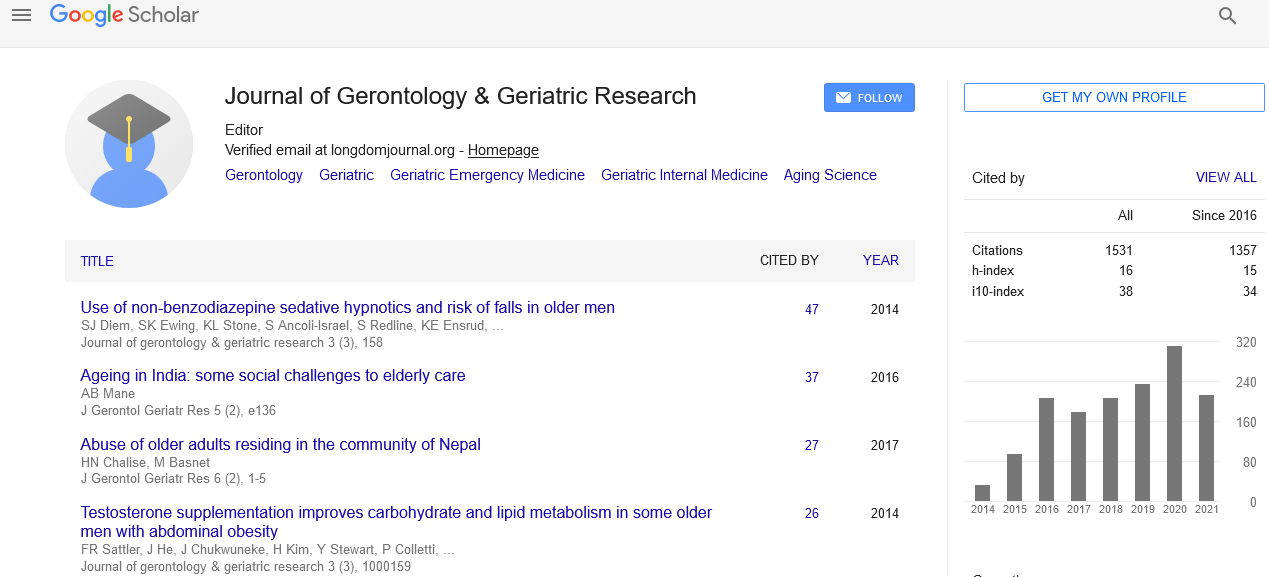PMC/PubMed Indexed Articles
Indexed In
- Open J Gate
- Genamics JournalSeek
- SafetyLit
- RefSeek
- Hamdard University
- EBSCO A-Z
- OCLC- WorldCat
- Publons
- Geneva Foundation for Medical Education and Research
- Euro Pub
- Google Scholar
Useful Links
Share This Page
Journal Flyer

Open Access Journals
- Agri and Aquaculture
- Biochemistry
- Bioinformatics & Systems Biology
- Business & Management
- Chemistry
- Clinical Sciences
- Engineering
- Food & Nutrition
- General Science
- Genetics & Molecular Biology
- Immunology & Microbiology
- Medical Sciences
- Neuroscience & Psychology
- Nursing & Health Care
- Pharmaceutical Sciences
What are the best predictors of happiness and life satisfaction for the elderly? A worldwide study across 8 regions
International Conference on Geriatrics & Gerontology
July 08-10, 2014 DoubleTree by Hilton Hotel Chicago-North Shore Conference Center, USA
Kayonda Hubert Ngamaba
Scientific Tracks Abstracts: J Gerontol Geriat Res
Abstract:
Elders are exposed to common chronic conditions such as arthritis, heart disease, stroke, diabetes and dementia. Dealing with these chronic conditions could be very stressful or can make some of them depress. Therefore, the need for monitoring quality-of-life outcomes can inform policies in lifestyle choices, and also guide therapeutic interventions and treatments of patients with stress, depression due to illness. As people are living longer, the need for investigating happiness seems to be very important. Despite the fact that most developed nations have accepted the age of 65 years as a definition of older person, the debate stills ongoing when poor nations are included into the equation as life expectancy across poor nations is sometimes lower than 50 years (e.g. 47.5 in Sierra Leone). Therefore, to investigate on determinants of subjective well-being in older people, this study has selected the age of 55 and over as target in order to include poor nations. This study investigates on differences in high, middle and low-income countries, and across 8 worldwide regions including Latin America, Asia, Africa, and Middle East. This study found three main determinants of subjective well-being: state of health, financial satisfaction, freedom of choice. Beside these three, it found a positive association between subjective well-being and trust, national pride, leisure, friendship, importance of God. On the other hand, a negative relationship has been found with meaning of life, corruption, accepting bribe, cheating on taxes. Differences across countries are discussed and economic policies are suggested.
Biography :
Kayonda Hubert Ngamaba is a member of the British Psychological Society (BPS), a Research Assistant Psychologist, working for both the NHS Manchester Mental Health & Social Care and the University of Manchester, where he is doing his PhD in Psychology. He got a Bachelor?s Degree in Counselling & Psychology, a Masters Degree in International Development from the University of Manchester. He has published papers in Journal of Mental Health, Religion and Culture, and has contributed in the BPS conference.


